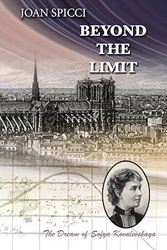The Dream of Sofya Kovalevskaya
by Joan Spicci
Tom Doherty Associates (Forge), 2002. 490 pages.
Review written June 8, 2025, from my own copy.
Originial review written September 1, 2003.
Starred Review
I’m celebrating my 25th year of writing Sonderbooks with #Sonderbooks25. My plan was to reread one book from each year’s Sonderbooks Stand-outs and post about the process. Well, things got complicated because I couldn’t confine myself to that – but the fact remains that Beyond the Limit was the one book I chose from my 2003 Sonderbooks Stand-outs to reread. And I’m writing a new review, not because that one isn’t still valid, but to include a blog post and have a review in the new phone-friendly format, while reflecting on the book after a reread.
This is still my absolutely favorite novel about a mathematician. Okay, I haven’t read a lot of novels about mathematicians – but it’s still the book I bring up any time anyone asks about mathematical books for adults, and it’s always been included on my Sondermath page.
The crazy thing about this historical novel is that it’s all true. Joan Spicci learned Russian and translated books and letters by Sofya Kovalevskaya before writing this book – and then she put what she learned into a novel. And okay, it’s not a work of nonfiction and we can’t promise she got everybody’s motivations and words correct – but oh my goodness, it’s a compelling story. And checking the Wikipedia page suggests that all the big dramatic events of the story actually happened.
The story tells the quest of Sofya Kovalevskaya to be the first woman to get a doctorate in Math. She was born in 1850, and the book begins with her a teen in Russia, studying with tutors, but not allowed to go to university at all in Russia. And she can’t leave the country without permission from her father or a husband. So her sister and a group of friends start looking for a man who will enter into a fictitious marriage with one of them, intending to sponsor the other friends as well. They find Vladimir Kovalevsky, and he agrees to enter into such a marriage with Sofya – but realizing that a fictitious marriage was considered criminal sacrilege in Russia at the time. Vladimir himself was a scientist and a publisher, having published Darwin’s books in Russian.
And then the novel shows Sofya and Vladimir falling in love. But she doesn’t dare live as his actual wife, because if she were to get pregnant, that would end any chance for studying at a university. And she faces all kinds of prejudice anyway, eventually finding a mentor who has to tutor her privately in her PhD work.
But along the way, the historical backdrop is amazing. She goes with Vladimir to London and meets Darwin and his wife. And later, her sister gets involved in the Paris commune portrayed in Victor Hugo’s work, and Sofya herself gets involved working in the hospital in besieged Paris – and her sister and her husband get arrested. This was another thing that, if it were known, could have ended her academic career.
On this second reading, I got pretty annoyed with her sister. She scorned any idea of Sofya falling in love with Vladimir – and then later married a man for love herself. But the whole novel shows us Sofya trying to please her sister, no matter how her sister treats her.
The whole story is gripping and makes me appreciate my own education much more fully – and gets you cheering for Sofya and the many obstacles she faced simply to get to exercise her brilliant mind and do mathematics. I still highly recommend this amazing historical novel.
Find this review on Sonderbooks at: www.sonderbooks.com/Fiction/beyond_the_limit.html
Disclosure: I am an Amazon Affiliate, and will earn a small percentage if you order a book on Amazon after clicking through from my site.
Disclaimer: I am a professional librarian, but the views expressed are solely my own, and in no way represent the official views of my employer or of any committee or group of which I am part.
What did you think of this book?
